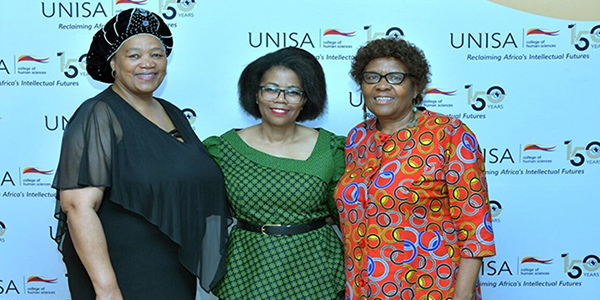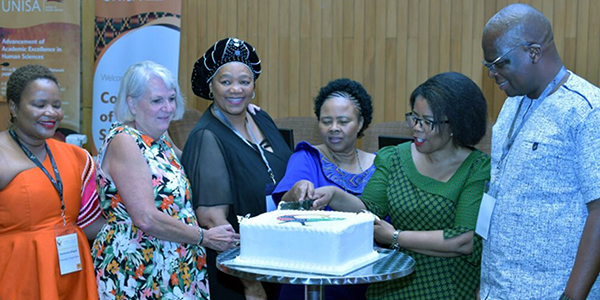Unisa’s Decoloniality Summer School Celebrates a Decade of Transformative Conversations
Unisa’s College of Human Sciences (CHS) hosted the 10th-anniversary edition of its esteemed Decoloniality Summer School (DSS) from 15 to 19 January 2024. This year’s theme was “Reflection, disruption and the realisation of decolonial futures”.
Founded in 2014 by Prof Rosemary Moeketsi, the idea of the DSS was inspired by a time when Moeketsi was the only black female academic in the College of Human Sciences (CHS) at Unisa and had to overcome significant challenges. Since then, the DSS has evolved into a global platform for challenging the enduring impact of colonialism and apartheid. Moeketsi, the former Executive Dean of CHS, expressed her pride in the school’s achievements and congratulated the current leadership. She hopes to witness continued growth, learning and positive change in the coming decade.

Prof Zethu Nkosi, Prof Puleng LenkaBula and founder of the Decoloniality Summer School and former CHS Executive Dean, Prof Rosemary Moeketsi
Over the past decade, Unisa’s Decoloniality Summer School has been crucial in fostering critical dialogues on the global decolonisation of power, knowledge and existence and during the 10th DSS, renowned thought leaders assembled to explore the theme from various perspectives, covering topics such as decolonising the curriculum, confronting global power relations and analysing geopolitics in the wake of the Covid-19 pandemic.
Prof Puleng LenkaBula, Principal and Vice-Chancellor of Unisa, emphasised the significance of this year’s theme and urged participants to focus on investigating the past and shaping current and future systems. “Unisa has been at the forefront of changing and shaping the lives of society through, among others, transformation and decolonisation,” said LenkaBula.
The Vice-Principal of Teaching and Learning at Unisa, Prof Motsa Madikana, highlighted decolonial strides and emphasised the importance of a structured approach to Africanisation. The university’s recent approval of a multilingual language policy that recognises all the official South African languages is a testament to decolonial progress.

From left: Kelebamang Mokgupi, CHS Head of Transformation Unit; Dr Britta Zawada; CHS Dean, Prof Zethu Nkosi; Prof Motsa Madikane; Prof Puleng LenkaBula; & Prof Sabelo Ndlovu-Gatsheni
The DSS celebrations included the ceremonial cutting of a 10th-anniversary cake. Kelebamang Mokgupi, CHS Head of Transformation Unit and Chairperson of the Decoloniality Summer School, told those present that Covid-19 had an impact on the annual summer school but emphasised the importance of continuing to work tirelessly towards decolonisation and transformation. “We pause to celebrate milestones realised by the Decoloniality Summer School since 2014 in terms of empowering our people to challenge the arrogant, cohesive, kaleidoscopic and violent legacies of colonialism and apartheid and to confront coloniality or neo-colonialism that continues in various forms in Africa and the world,” she added.
The distinguished group of presenters included Linda Martín Alcoff, Professor of Philosophy at the City University of New York; Lewis R Gordon, distinguished Professor of Philosophy and Global Affairs at the University of Connecticut; Sabelo J Ndlovu-Gatsheni, Professor and Chair of Epistemologies of the Global South at the University of Bayreuth; Pamela Maseko, Executive Dean of the Faculty of Humanities at the Nelson Mandela Metropolitan University; Artwell Nhemachena, visiting Associate Professor at Kobe University and Research Fellow at the University of South Africa; and Dr Mashudu Rubson Dima, a renowned African health practitioner.

